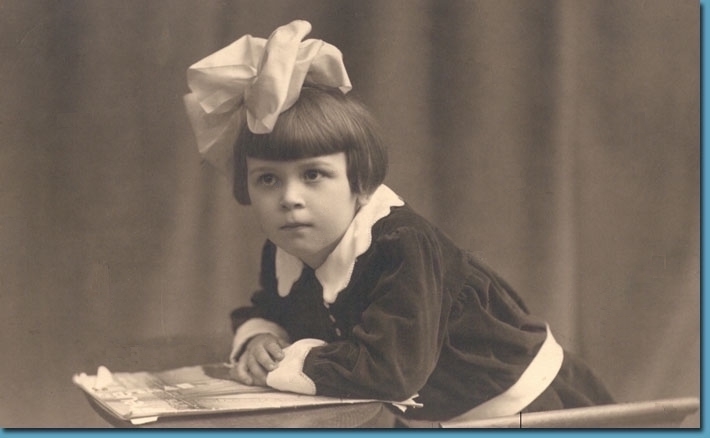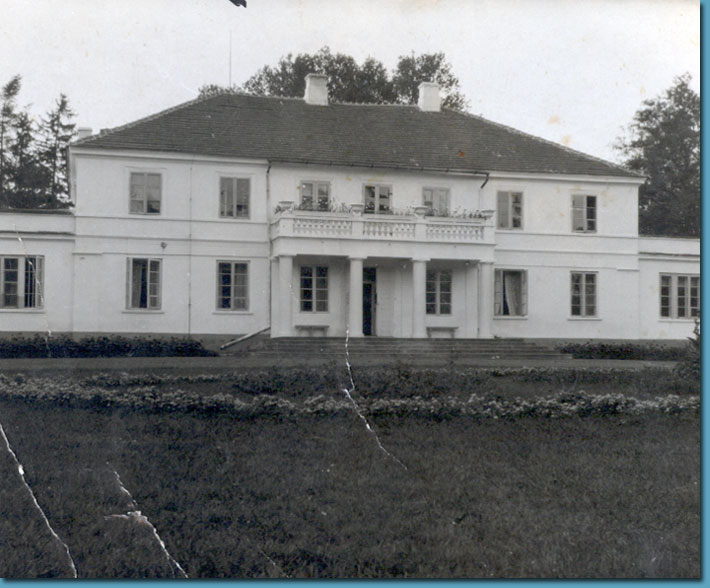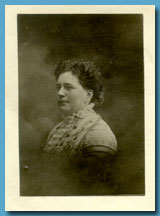Charming Memories from Childhood, Mała Ojczyzna Zborów 1937 – “From the Diary of Little Masia” – author: Maria Garczyńska – Borkowska
My family home in Zborów
“MANEUVERS” – FROM THE MASI DIARY 1937/1945
My family home in Zborów (12 km away from Kalisz along the road to Turek, or by a “latecom” to Kokanin) is a classicist Polish manor house supported by four columns, surrounded by a park. It was a year or two before the war. I was 11 years old. The holidays have started. The teacher, our beloved Miss Maria, has gone on vacation, and the French one “to the children” (ie to me and my brother two years younger) has not come yet. On that memorable summer day, my parents went to a family reunion in Jarantów, to the Radoński family. My younger brother Witek stayed under my care – I felt very grown up.
Some time after my parents had left the manor, two soldiers drove up on horseback. They wanted to see their father. As it turned out the next day, maneuvers of the 29th Infantry Regiment were to begin in the area. The soldiers were sent to ask if (as two years before) the regiment could count on hospitality and accommodation in Zborów. Father was gone. I decided that I could represent him. I made my decision without hesitation. I stated that I was expecting a regiment
the riders disappeared into the fir alley leading to the park’s eastern gate, I began to act. It was necessary to prepare accommodation and supper for soldiers and officers. At this time, our dairy woman was in Kalisz, who would take milk, fruit, asparagus and other vegetables to the city every day in a “springhouse”, and in Kalisz shops he would arrange errands for him “for the church book”. I called Herbrich (the best butcher in Kalisz) and left for the milkman the purchase instructions for meats and cold cuts previously agreed with the cook for dinner (including, of course, my favorite sausages). A phone call to Mayer (the best pastry shop in Kalisz) got some cakes and cookies (including my favorite puff pastry). There had to be coffee ice cream for dessert after dinner, but our cook did the best.
And what’s next? I was alone, but I knew who to count on. Old Wawrzyn, my grandfather’s former butler, was here for life imprisonment. He knew everything – on the label, on the livery, wines appropriate to the menu and glasses appropriate to the wines, the right cutlery and tableware for the occasion. He did scare me about what it would be like when my parents returned, but he decided that he could not refuse to help me. I represented a house where he had served for so many years and was treated like a family member – he felt responsible. He delivered bed linen for officers to the guest rooms of the manor and commissioned the preparation of sleeping places in barns for soldiers. He ordered dinner tables for them to be set up in the park near the outbuilding, where the court kitchen was located. At my request, he chose the wines himself for the officers’ dinner. A large table was set up for them in the dining room. After covering and setting the tableware, I decorated it myself with flowers. Everything was ready. I was happy. I threw myself on Lawrence’s neck.
Now I had to think about myself, this is dressing up for dinner. I found mum’s gas stockings in the bedroom. In my opinion, they were suitable for black patent leather “buttons” and for a navy blue velvet dress with a lace collar. I liked myself and I would feel completely confident if it weren’t for the thought that my younger brother might ridicule me in front of the officers. It had to be remedied. I decided to bribe him. I promised that if he did not reveal himself and remained in his room upstairs, I would invite his favorite friend, Adam, the son of the steward, to accompany him. They’ll get dinner and double ice cream in the room. In addition, I promised Witek a thing that he envied me very much. It was a tiny Swiss radio, unheard of in Poland at the time, a gift I received for Christmas from my father’s friend, the Polish ambassador to Switzerland. After taking all the interesting games to the boys’ room so that they wouldn’t get bored, I locked the door. Now I could feel safe. I stopped being afraid.
When the officers arrived, I greeted them outside the house. As the day was beautiful, I suggested a walk. As my parents always did, when someone came to Zborów for the first time, I showed the guests the surrounding park, a beautiful row of hornbeam trees, old plane trees, fir and chestnut alleys and other beautiful corners of the park. Finally, I led the officers to our 18th century shingled filial church where I was baptized.
Laurel chimed the gong to signal that supper was ready. As befits the lady of the house and the only “woman” in this group, I sat in the first place, at the head of the table. Bearing in mind the topics that the adults discussed during the conversation (while our children sitting at the end of the table were not allowed to speak at all), I entertained my guests with a conversation about this year’s harvest, fertilizers used and my father’s favorite horses. The lieutenant sitting next to me on my right seemed delighted with me. I felt happy and appreciated. .. The lieutenant entertained me by telling me about the charms and hardships of a soldier’s life. I fell in love for the first time.
Officers raised toasts in my honor. The laurel in a festive livery poured them wine, and in order to be able to revenge myself with a toast, I got some Madeira at the bottom of my glass. My ancestors, Garczyński, and my great-grandfather Radoński, the father of my beloved grandmother, who were deported after the January Uprising, looked at me from the portraits on the walls. The coffee ice cream, served as a dessert, turned out to be excellent as always. Dinner was drawing to a close. I was just about to invite the officers to the lounge, where bridge tables and coffee were waiting for them when the Parents appeared.
My mother, seeing the table set and the laughing daughter among the officers, wanted to immediately send me upstairs without giving me a chance for any explanation. But my father stopped me. With a trembling voice, I explained that I could not refuse the request for hospitality and that I was trying to replace them somehow in the absence of my parents. My father did not hide his pride in his daughter, but it did not change my mother’s position, who sent me to bed late in the day.
While the parents now warmly welcomed the officers, the dethroned “lady of the house” became a little girl again like Alice in Wonderland. I was crying as I walked slowly up the stairs when my lieutenant caught up with me. He promised to knock on my door in the morning to wake me up and take me to maneuvers. I haven’t slept all night.
At dawn, when the whole house was asleep, I went on horseback with the regiment for maneuvers. I ate pea soup from the field kitchen, gave orders to soldiers. I knew what awaited me when I returned, but it was worth it.
These were my first and, as it turned out, last maneuvers in my life. As a farewell, I offered “my” lieutenant Kozal a picture of the Mother of God with the dedication “In memory of the joint maneuvers – Masia Garczyńska”
War broke out. The storm of history has collapsed. Kalisz was recognized as the “Urdeutsche Stadt” and its surroundings were incorporated into the Wartegau. The Germans settled in our court. My parents, along with me and my brother, were displaced to the General Government. Old Laurel was saying goodbye to us.
“Liberation” did not return us to our family home, after the loss of which I never felt safe again. In 1945 I found myself in Kalisz. One day I was walking near a beautiful city theater, along Alleys formerly named after Józefina, then Aleksandra Piłsudska, and then probably Lenin or Stalin. An officer in an Anders’ uniform was walking in front of me. Many such people returned to Poland then. The officer stopped “Is Maria Garczyńska from Zborów?” “Yes,” I replied, surprised. “So I invite you for some ice cream! Do you recognize me? Lieutenant Kozal ”I ordered coffee of course. They weren’t as good as the others. My companion took a calendar from his uniform pocket. He took out a picture of the Virgin Mary with my dedication “In memory of joint maneuvers …” and said, “I had the whole war with me.”
Maria Garczyńska-Borkowska
_____________________________________________________________
Christmas is finally here.
Movement and bustle at home. The children are waiting … they spin. After dinner, which is actually breakfast, we decorate the Christmas tree. To this day, I do not like small, flower-shaped Christmas trees or stylish silver and white trinkets.
The Christmas tree in our house reached the ceiling and was fabulously colorful. A huge box of toys, folded from year to year, was supplemented with this year’s chains, a clown, a jug – various creations of the child’s imagination. Nuts, red apples and gingerbread frosted hearts hid among the forest-smelling branches.
Candlelight was reflected in the shimmering rainbow bubbles.
Children dressed after the Christmas tree.
With a stiff white bow in my hair, Witek and I wandered from window to window waiting for the first star.
I always remember when something I waited for a long time came, when it was just around the corner, it seemed impossible to me. I pinched myself to see if it was not a dream.
But it wasn’t a dream.
We were standing at the white-covered table.
When the wafer was broken, my mother always cried, and my father gave us a little speech, which was supposed to be upbuilding, but which he did not finish because it bored him. My father did not like being taught – he was not able to instruct himself either. Whenever he had to complain to me for something (because Father also has to “apply” himself) – he was so embarrassed that I felt sorry for him and I said everything he had to say for him that I supposed to guess and that I would not be anymore.
My father patted me kindly on the shoulder and, with relief, backed away. Dear, non-pedagogical father – we were so similar to each other.
There was a disturbing silence after Christmas Eve.
Even when I already knew that “Gwiazdor: it’s not true – I felt a slight pressure around my heart when he entered with a long beard, sheepskin coat and a bag on his back. And at the moment I certainly believed in him.
The most beautiful toys were not worth the moment of borderline fantasy and truth.
Don’t make your kids cross the line that you’re too big, you’re awkward, and the kids are fragile. Your zeal can destroy more than faith in Gwazdor, faith in dreams, in selfless Beauty, in something that the very poor will be deprived of, even if you give them the most.
_____________________________________________________________
The days are cold, winter.
There is a frozen world on the windows.
Christmas feasts.
We spend our days outside.
Zziajani, snowy – with red ears and noses
In the yard – in the so-called In the “hole” there is a duck pond, where you go down the hill in a sledge.
They carry them across the ice to the other side.
Back and again.
We are carried along with the joy of movement and air.
We make belly-like snowmen, we fight snow battles.
We are so happy.
Miss Maria went on vacation.
We miss a little and use a little.
Interregnum.
The postman brings necks from her, illustrations of the last reading.
I get Zagłoba, cutting Helena’s hair, and Witek, Ursus lifting Lidia from the arena.
The postman walks away waving his hand.
From the village you can hear screams: “Herody”
They are walking in a tight group with a grotesque Death in front.
I’m scared, I’m so scared that it doesn’t help to know that they are a disguise, that I know these boys.
Witek rushes to meet them, and I run home, home!
I can feel their screams behind me, the clash of the devil’s chain, the world of the scythe.
I run into the porch.
I pound, pound on the door.
At last. I fall snow-covered, wet, not hearing the screams.
I’m rushing to Grandma.
As every year, when everyone is watching the show, when they persuade and explain to me (as if I did not know) – that they are disguised – only my grandma does not persuade me. And today he does not ask. He calmly walks to the door. Locked. Is smiling.
“We’ll play garibaldka”
I look at the trickles of water flowing from my snow-covered boots.
“Basia, I know it’s … but I … can’t.”
Quiet outside the window, it’s snowing, the room is warm and safe.
Herod dies in the hall.
Maria Garczyńska-Borkowska
_____________________________________________________________
Mother’s memory of Radońska’s great-grandmother, i.e. a short history of a Polish family.
Grandma was stout, her legs were bad, and she walked slowly with a cane. But she wasn’t a grandmother, she had nothing to do with grandma. Grannies are small, bent. She was a type of Polish matron, without a false gesture. She really was.
A portrait of her father, with a long black beard, hung in the dining room. He was an insurgent in 63. He was sent to Siberia.
The wife, the beautiful, slender great-grandmother in the portrait, left the children to her mother and followed her husband.
Being in poor health, she died of consumption.
Grandma said that my father never laughed when he returned from exile. He always wore the shawl his wife wore in Siberia.
This story excited my childish imagination. I couldn’t comprehend that my own, so well-known, beloved Grandma, rubbed so closely against a story that I only knew from books.
It had a big influence on my attitude towards her.
It was childish, but very deep.
Grandma wore long dresses, and her dark hair, which was only slightly gray despite its age, was tied in a knot.
With all this, she was so simple, so kind.
Her truthfulness was famous, and no one dared to exaggerate in the slightest, let alone lie.
I remember today when she “poured out” the truth into her self-confident nephew when he was boasting about some snobbish “connection”.
“You didn’t see him somehow,” she said in the general silence, “when he didn’t mean so much.”
It was hard to impress her.
She had a big heart and a clear, simple mind that could not stand delusions. She loved us very much and among the old yellowed photographs there were many of ours, signed with her high, monastic letter “Masia and Witold”.
I often went with her to the grave of my grandfather, who died before we were born. They said they loved each other very much, and when she sat on the bench next to the grave, I didn’t know if she was praying or missing or talking to him. It wasn’t some “grave walking”, it was a visit. She was also able to laugh honestly and heartily, and on her fair face then bloomed almost maidenly blushes.
She read a lot and when it was difficult for her to walk, she said with great serenity: “The most important thing is that I have you with me and that I can see you all. And I can read it is the greatest joy of old age. Perhaps the greatest disability is blindness. ” Fate did not spare her either.
During the occupation, when we were thrown to Warsaw, she lost her sight.
Unable to go down to the basement quickly during the air raids, and not wanting to expose anyone, she demanded that it be placed near Warsaw. We drove there to visit her.
She always greeted me with such joy. She said – “How pretty you look! I can see it for real. ” And I know she saw it because she loved me very much.
On the news of the outbreak of the Uprising, despairing about us and the fate of matters which she could not talk about, but which she taught us to love, she suddenly died of a heart condition.
This news reached us after the Uprising, and although I managed to deal with the death of young and full of life people, this death shocked me, I felt its loneliness.
She’s gone. A man whom I loved very much when I was a child and to whom I was not allowed to give anything but love.
Maria Garczyńska-Borkowska
_____________________________________________________________
Recollection of Dr. Grzmilas.
Grzmilas was an old Jewish paramedic. He came to us when we were sick. He brought peace and some old monastic philosophy with him. He ate separately, with his head covered – probably only eggs, which his religion allowed him in the “goyim”.
For me, he was the embodiment of the Old Testament sage.
He had so much dignity, everyone respected his habits. No one would dare to offer him something that he would not accept. It was also when some Jewish merchant was eating pork chops in our house that I waited in horror when Jehovah would turn him into a pillar of salt.
Old Grzmilas, once asked by my little brother if Santa would come to him, replied, “Nu, he must come – as you believe in him.” He couldn’t say otherwise.
“I am with you,” he said, “I can be what I am,” you will respect, me too. I like coming here. I am not surprised, you are not surprised. We are people ”.
There was something great, and at the same time humiliating, that he couldn’t “like to come” everywhere.
He was kind and wise, and we preferred his visits to the fragrant young doctor who joked with us but did not worry as much as Grzmilas was about our disease, nor did he enjoy our recovery as much.
Grzmilas had a daughter whom he loved more than his life and who died before the war. He turned gray, he leaned over after her death, and to my mother, who hugged him with tears in her eyes, he said: “You are a good woman, but what can you help me? Nobody will help me anymore ”
I don’t know what happened to Grzmilas during the war. Whether he survived or died. Perhaps he thanked Jehovah that he had taken his beautiful Rose with him earlier, that he had spared her father’s dear dear …
Perhaps he admired his wisdom and repented of the moments of human grief? We couldn’t help him then, even though he helped us so often and taught us so much.
Maria Garczyńska-Borkowska
_____________________________________________________________
“LOUD READING BOOKS”
Long autumn evenings.
We drew, we made toys for the Christmas tree, and Maria read. I will never forget those evenings.
Reading aloud, and especially reading to children, is a great art. Miss Maria read passionately, toning her voice suggestively. She was an unmatched actress. It was impossible not to listen to her. She read us books that are difficult, actually too serious. She hated books, she said, that made the world dumb and caricatured. She always chose those that develop passions – travel, history – interesting in time.
Rightly judging that a book written for a child, which reads without pleasure, will not be won by an adult and a child.
Books, apart from those that we received as a gift, we bought ourselves for the money we saved. When leaving for the city, you would go to the Town Hall Square, to Mr. Jasiński’s bookstore. To this day, I remember the mood that enveloped me after going inside. With two or three zlotys in my hand, I was the most hesitant customer. Because was it possible to make up your mind? Colorful covers, titles that promise great emotions, secrets….
With age and reading, I already knew the authors and looked for their names on the colored covers, just like pictures in a book and then titles speak to young children, a child who can read should already know more important authors. So we collected books full of smiles and deep humanity to Makuszyński’s library. Przyborowski – bringing the story closer, Buyno-Arent with its passionate “Green madness”, pirate and “Indian” books, rather for boys, maybe also “Ania”: Montgomery, which I am now completing for my Ewa, unable to wait when she grows older.
When I go to the bookstore with my children to buy a long-chosen book – I let them watch, enjoy all the books – it’s almost as if they had them for a short time.
Among the books, there was one that was lost, or was only borrowed, but we couldn’t finish it – “In a Burnt House” or “Court” – maybe otherwise? I remember that not being able to finish this book was a terrible experience, and I still miss it to this day – maybe precisely because it has become a symbol of something unsaid, something to be waited for, maybe not only in my childhood.
I am tired, sometimes impatient, and yet I should know that my children are experiencing this unique experience right now, which they will always remember, badly or well.
Home of his childhood.
Toys for the Christmas tree, gluing in the evenings, chains, infinitely extending, eggshells from which funny clowns and dumplings were made.
A large table full of colored paper, a large plastic jar against scissors, which you were looking for with the proverbial hitting the table.
A Christmas tree is not only Christmas Eve – it is a whole autumn of preparations, gilding, gluing, embroidery for Mom, carefully hidden in a drawer. Since then, I have liked long autumn evenings, so sadly greeted by everyone.
In my old house, autumn was a log on the fireplace, it was St. Andrew’s Day, when the wax was poured.
What was not seen in these misshapen, sticky cakes?…. There were horses in a rush, and some strange locks and necklaces, there was all the “unknown” to which the child leans. And releasing soap bubbles from this year’s fresh straw – colorful and short-lived bubbles.
My childhood evenings.
Has it ever felt so good in the day that you have a home? When the old floors creaked, the shutters groaned and creaked, and the large shade of the kerosene lamp cast a circle of light on the immediate world, leaving corners in the shade – how safe, how good it was at home.
How tactile his care felt.
When someone pulled up, he brought moisture and darkness into the hall, smelled of rain, leaves and the court, until the house took it apart and warmed it.
There was a smell of sour rye soup with bacon and potatoes in uniforms, and my father said: “It must be snowing” and it was falling. At night. In the morning, white woke us up – the whole world was hidden.
Maria Garczyńska-Borkowska






